Travel app development in 2025: process, features, and costs
Alex Ragin
Updated Jan 19, 2025 • 23 min read
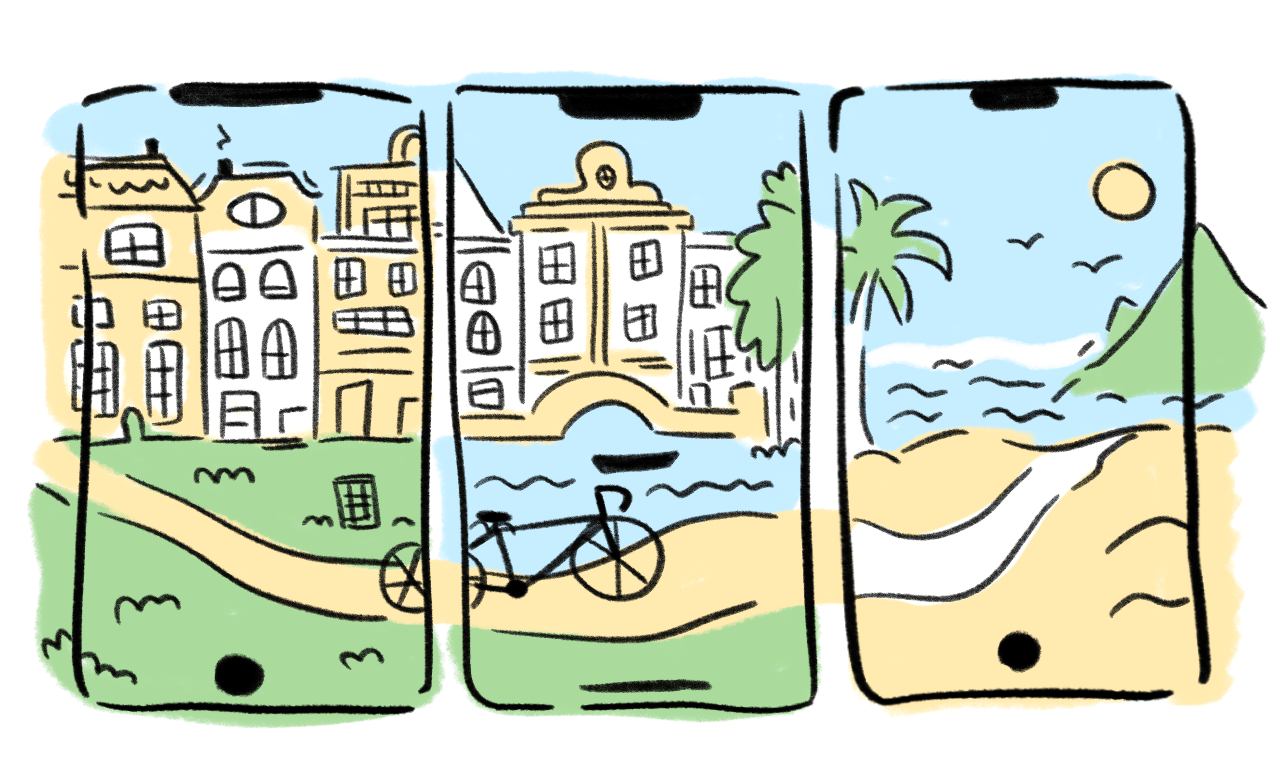
In this article
What benefits can a travel app give your business?
Travel app types
Integrations (back office, inventory suppliers)
Must-have travel app features
Travel app development process
Agile approach
Best practices for travel app development
Tech stack for travel app development
Travel app development team
Timelines and costs
Tips for choosing a travel app development partner
Our experience in travel app development
With 67.8% of all traffic in the travel industry coming from mobile devices, it's no surprise that travel apps are becoming increasingly important. From travel planning and trip booking to staying connected on the go, apps are the best companions and tour guides a traveler can have.
At the same time, travel apps offer companies unique brand and growth opportunities, which is why many travel businesses are investing in travel app development and mobile digital transformation with great success.
Selecting the right travel app developers is crucial, as the process often requires specific knowledge about app development and integrating travel inventory, connecting to GDSs, and ensuring the app supports the traveler at each stage of their journey.
We’ve created this comprehensive travel app development guide to help you learn everything you need to know about mobile apps, app development costs, ticket booking app development, and not miss out on the opportunities travel apps provide. Let’s dive into the mobile travel app development process and see how apps can transform OTAs, tour operators, startups, and other travel companies.
Looking for travel app development experts?
Let's discuss your project
What benefits can a travel app give your business?
If you are a mobile-first travel company like Hopper, this is quite obvious, but if your existing travel company is only thinking about building one, here are the core benefits:
1. Repeat bookings
Mobile apps are all about loyalty. Getting users to download the app is more expensive than clicking on your website, but it almost always pays off. Use user data to provide personalized travel recommendations based on past bookings and preferences. When travelers see suggestions that match their interests, they are more likely to book again.
Enable users to quickly rebook past trips or favorite destinations with a few taps. Simplifying the rebooking process makes it convenient for users to choose your travel company again.
Booking.com's or Agoda's apps are great examples. If you book a hotel room with them, it takes just a few minutes to research options, pay, and receive a confirmation. That's why almos half of Booking.com's bookings come from mobile.
2. Access to mobile-only features
Offline access, location-based services, mobile wallet integration, in-app purchases, and in-app messaging are features available only in mobile apps.
If you offer destinations with slow internet or expensive data roaming, providing a travel app with trip details is a must.
3. Push notifications
What happens after travelers have an amazing experience with you? At best, you may send them a couple of emails promoting new destinations or experiences. Those emails are fine, but most will get lost in their inbox.
Mobile apps hit differently. You can engage with customers directly via push notifications, with an open rate 10 times higher than emails.
4. Customer support and experience
Another strong reason to create a travel app for your company is that mobile apps provide a direct channel for customer support, enhancing the overall experience with instant assistance and real-time updates.
Thanks to generative AI and support agents, you can automate this process without hiring additional staff.
5. Data-driven marketing
Many travel brands use both personal and anonymized user data to create personalized marketing messages for their travelers. With the latest technologies, you can make them feel like you know their preferences better than they do themselves.
Combined with the push notifications we discussed above, this significantly increases LTV.
6. Sustainability
Support sustainable travel by reducing the need for printed materials and enabling eco-friendly travel options.
7. Fast and secure payments
Apple Pay and Google Pay are the most secure and fastest payment methods available today. Don't force travelers to submit their credit card info repeatedly when they can pay for their travels the same way they pay for coffee at Starbucks.
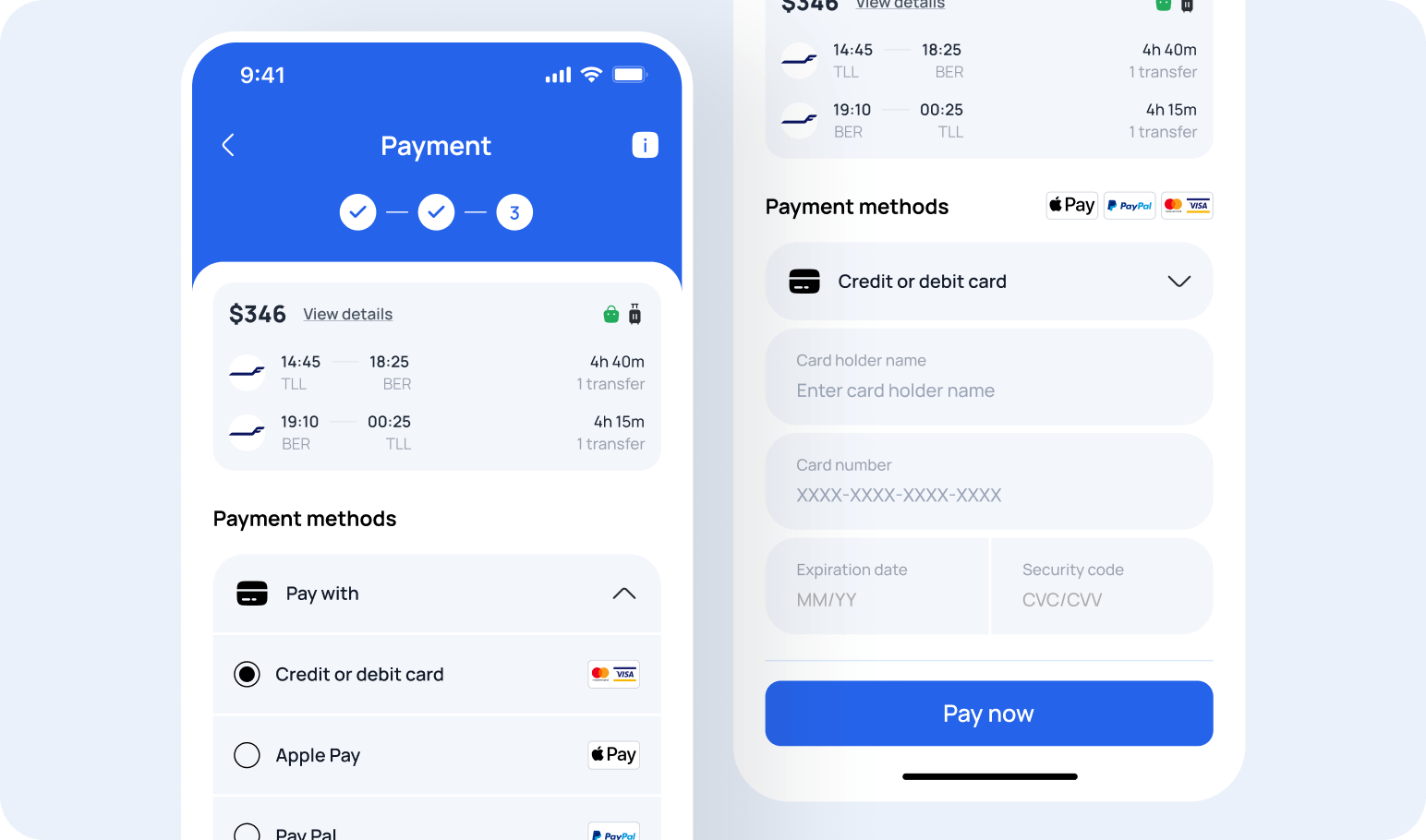
Travel app types
While many people think travel app development is the same for all app types, it's not that simple. Mobile apps are more than just what you see on the App Store or Google Play. Each app requires its own set of integrations, logic, and architecture. For example, booking apps should safely connect to GDSs, while modern travel planning applications primarily rely on AI capabilities.
Booking and transportation apps
Booking and transportation apps help users make reservations for flights, hotels, car rentals, and other travel necessities. These apps require inventory management functionality, meaning they should have a comprehensive inventory of available accommodations and transportation options.
Modern customers also expect integrated payment gateways for seamless transactions and a user profile feature that enables them to create and manage their bookings, preferences, and booking history.
If you are building a hotel booking app or a flight booking app, then it should be integrated with your server to fetch the latest real-time availability, content, and place orders. These connections should be fast and secure.
Travel planning apps
The purpose of a trip-planning app is to assist travelers in organizing their itineraries. Users can create detailed trip plans, view guides on travel destinations, and sometimes book excursions.
With the rise of generative AI, travel itinerary planning apps have gained popularity through successful examples like Layla and iplan.ai. These apps enable travelers to create personalized itineraries without human assistance.
To build a successful travel itinerary app, you'll need to pick a niche. There are different types of apps, including those focused on budget travel, family vacations, solo travel, and adventure trips. Each type will have specific features tailored to the respective travel preferences.
Concierge apps
Unlike a travel planning app, a concierge app provides personalized assistance to travelers. It offers a range of services and information, such as recommendations for restaurants, attractions, and activities based on users’ preferences and locations. Concierge applications may also provide real-time updates on the weather and connect users to emergency assistance.
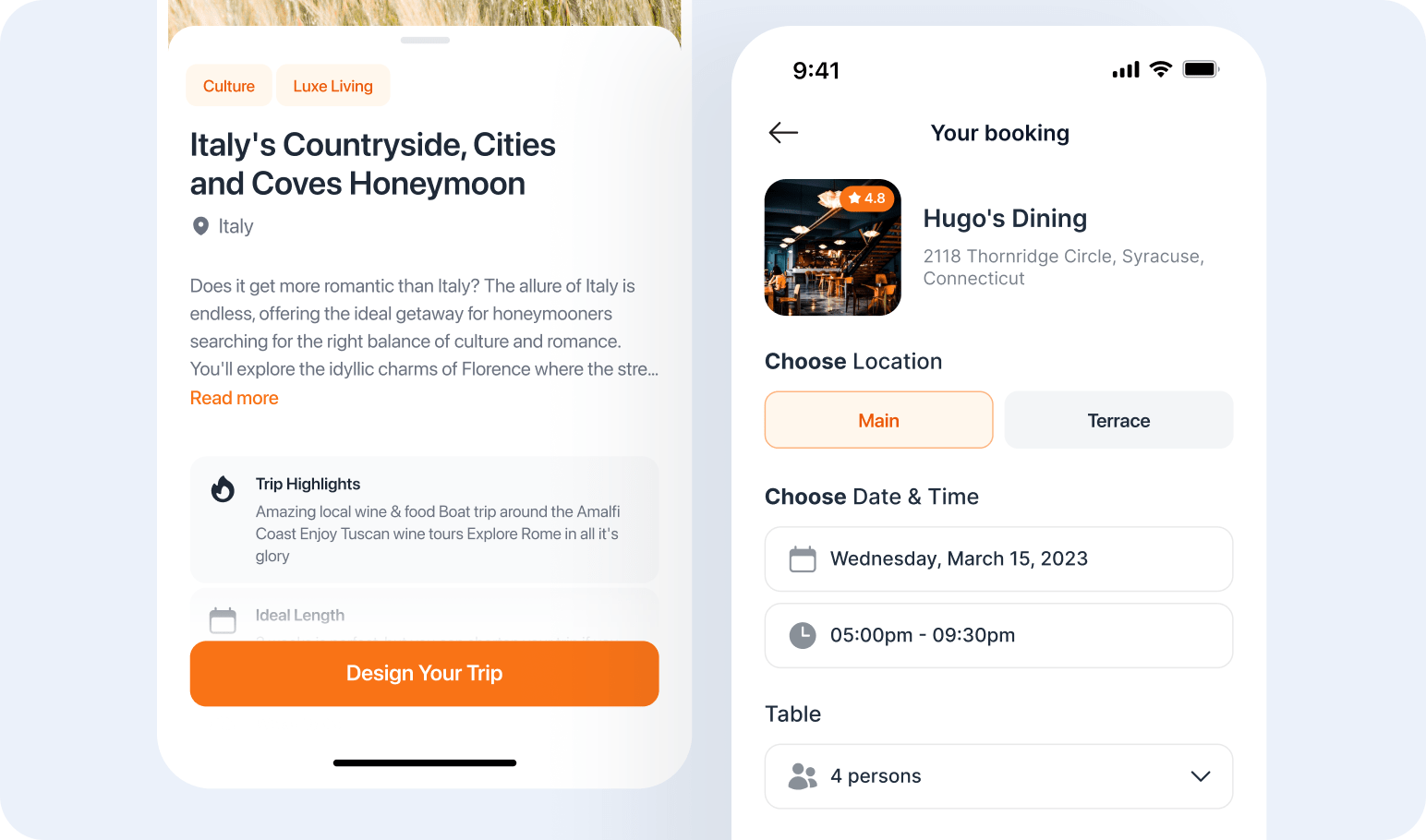
These apps rely on in-app chat tools that can connect travelers with agents for personalized support. They should also be capable of creating, viewing, and managing personalized travel itineraries, including flights, accommodations, activities, and reservations.
Tour guide apps
Tour guide apps serve as virtual guides, providing information and assistance during trips. They offer audio guides, maps, and detailed information about popular tourist attractions and landmarks. These apps enable users to explore destinations at their own pace, following suggested itineraries or creating their own.
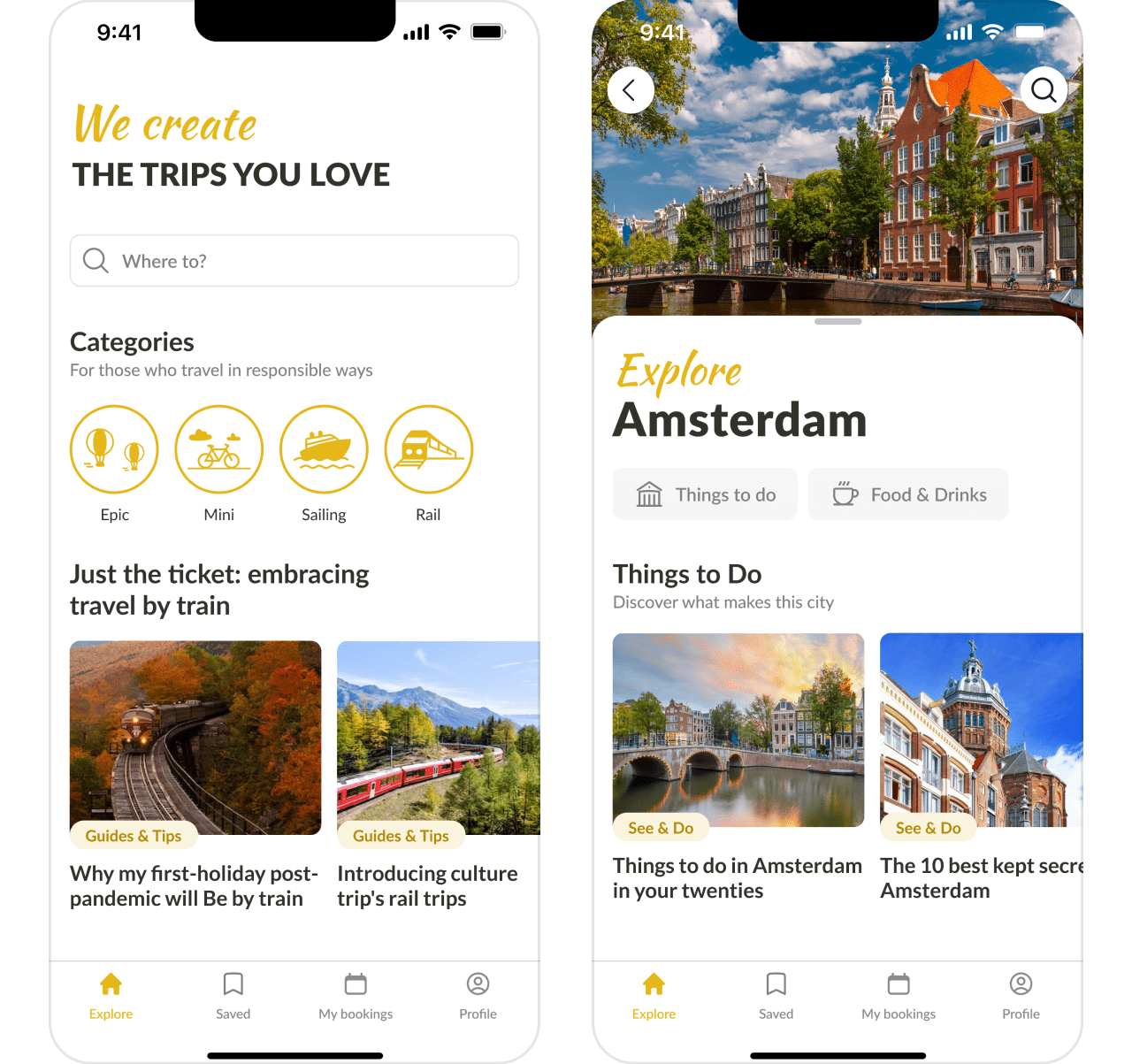
Tour guide apps rely heavily on rich content, so detailed descriptions, images, and other media elements are essential. Despite being content-rich, the app's interface and user experience should be user-friendly and simple to navigate.
Business travel apps
Travel apps for business travelers are different. The core features of a business travel app should be built around corporate policies, approval workflows, and expense management. Additionally, the inventory focus will differ from leisure apps: business travelers typically prioritize transfers and hotel amenities over excursions.
Miscellaneous apps
This category includes all other apps that do not fit into the main types, such as travel insurance apps, navigation apps, ticket booking apps, currency conversion apps, etc.
Integrations (back office, inventory suppliers)
When planning a mobile app, remember that the information displayed comes from the server via APIs. This server connects to other systems, including travel API suppliers, booking system, and your internal database with bookings or users.
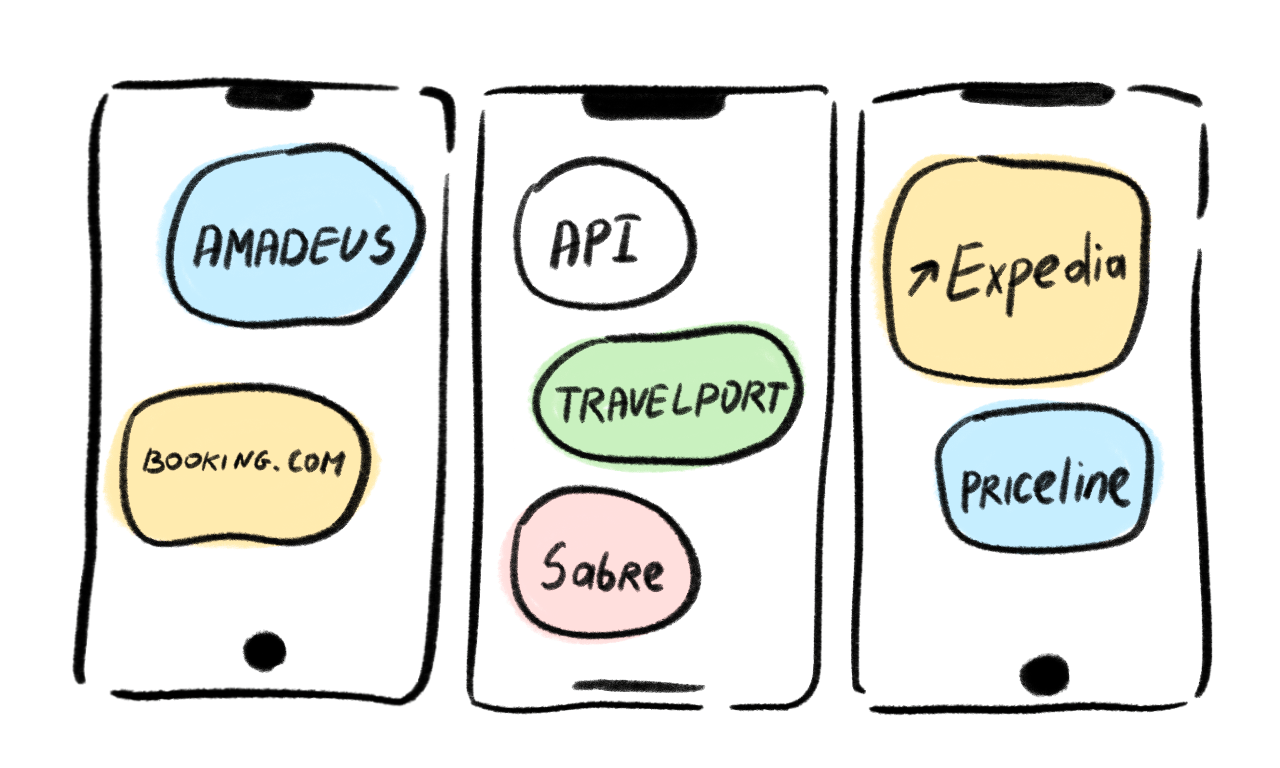
These integrations allow your travelers to access their bookings from the mobile app, displaying the same information they see on your travel portal.
Mobile apps don't function independently. They must connect to external systems like back office or inventory supplier APIs (GDSs, bed banks, etc.).
Must-have travel app features
While we discussed the core and advanced features of travel apps in a separate article, here is a recap:
Onboarding
An intuitive onboarding process helps new users understand the app's features and benefits quickly. It should include a brief tutorial and an easy sign-up process to get users started smoothly. Effective onboarding can increase the retention rate by 50%.
Authentication and user profile
Email and social media platforms logins (e.g., Facebook, Google) are essential. Enabling users to create profiles with a few taps is one of the must-have features for mobile travel apps.
Remember, if you add Facebook or any other social login to your iOS app, Apple Sign-in must be added as well, or your app won't be approved by Apple.
Search and filters
Advanced search functionality and filters help users find exactly what they want. Whether it's flights, hotels, car rentals, or activities, users should be able to narrow down options based on their preferences and needs.
Booking process
A streamlined booking process is essential for user satisfaction. For instance, if you are building a ticket booking app, this includes selecting options, entering details, and confirming bookings with minimal steps and maximum clarity. All of this is done via integration with your booking system.
Booking management
Users should be able to view, modify, or cancel their bookings easily within your travel app. Booking management features should include access to booking details, confirmation numbers, and customer support options.
Payment gateway
Integrated and secure payment gateways, such as Apple Pay, Google Pay, and saved credit card options, provide a seamless and secure transaction experience. Users should feel confident that their payment information is safe.
Push notifications
Push notifications inform users about their bookings, upcoming trips, special offers, and real-time updates. These notifications should be timely, relevant, and personalized to enhance user engagement.
Real-time updates
Providing real-time updates on flight statuses (e.g. for flight booking apps), gate changes, weather conditions, and other travel-related information helps users stay informed and reduces travel stress.
Offline access
Offline access to essential information like itineraries, maps, and booking details is one of the advanced features that ensures that users can access critical data without an internet connection. This is especially useful in areas with poor connectivity.
Maps (Google Maps, Apple Maps)
Integration with mapping services like Google Maps or Apple Maps allows users to easily navigate destinations, find points of interest, and get directions.
Support chat
In-app chat support connects users with customer service agents or AI chatbots for instant assistance. This feature is crucial for resolving issues quickly and enhancing the overall travel experience.
Travel app development process
Developing a travel app is a multi-step process that requires several people. Done right, you'll have a travel app that will serve your travel and hospitality business well for many years ahead.
At Zoftify, our agile travel app development process consists of the following phases:
- Product discovery
- Design
- Development
- Release
- Maintenance
Product discovery
The travel app discovery phase is an optional yet highly recommended step in our tourism app development process. This starts with a workshop where we discuss and define the success criteria, measurable outcomes, target audience, features, and priorities for your app. Then, we proceed with market research to enhance the travel app idea. This ensures the app will incorporate travel and tourism industry best practices and travel app trends.
Another important part of the discovery phase is technical analysis. Travel apps require numerous integrations (flight booking with GDS, hotel booking with bed banks, OTAs, and other travel inventory providers). Our team will help you assess which APIs to connect to, how to obtain API keys and draft the technical architecture diagram.
However, if a company knows exactly what it wants and has a comprehensive list of requirements and desired APIs, we can skip this phase and proceed directly to design.
Design
The design phase can sometimes intersect with the discovery phase and often be a part of it. It consists of several parts:
- Identifying user flows
- Creating wireframes
- Developing clickable prototypes
- Designing UI kits
- Producing high-fidelity design mockups
Design requires continuous feedback. Both designers and clients should explore travel app ideas and agree on decisions together.
UI/UX is crucial — if users feel something's off with the app's look or feel, they might abandon it. A clean design will make your company seem professional and reputable, while usability and ease of navigation will encourage users to stick with your app.
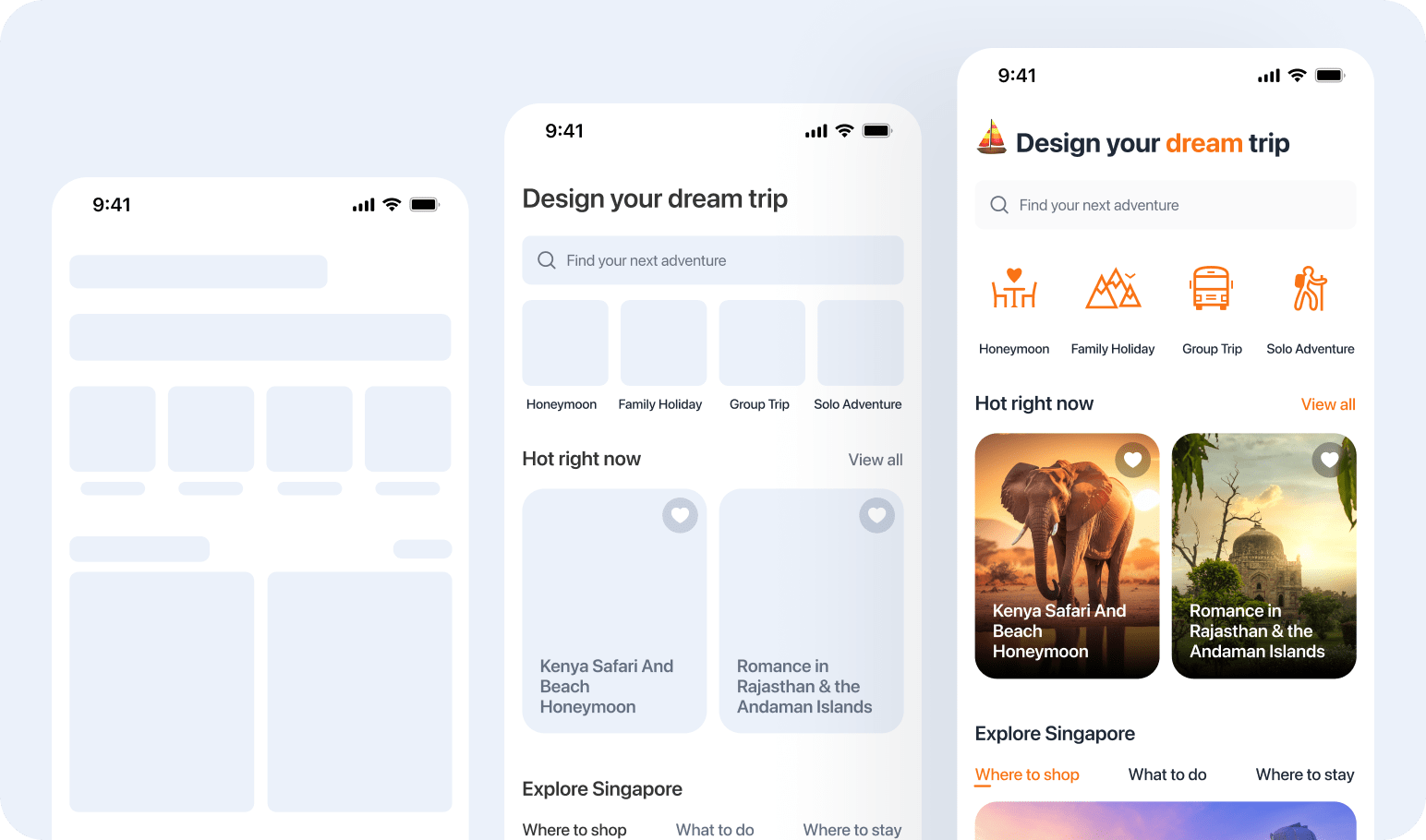
For design, we suggest using Figma, which is an industry standard for UI/UX development tools. Ensure the app is designed with reusable components to make the development process smoother and pixel-perfect.
Looking for experts in travel app development?
Let's discuss your goals and priorities
Development
The development phase is the most time-consuming part of the travel mobile app development project. This is where coding takes place. Developers, QA (quality assurance engineers), tech leads, and project managers work together (preferably in an Agile way) to develop the app's features.
At Zoftify, we practice pixel-perfect development, ensuring the app looks exactly as designed.
App development isn't limited to the mobile side. If your app requires integrations with inventory suppliers or back office systems, those must also be built. API integrations with third-party systems (e.g., GDS, bed banks) are performed by backend developers.
QA engineers test the app to ensure it works as envisioned, from usability and performance to security and functionality. If you have your own testing team, they are welcome to participate.
Release
Both App Store and Google Play have their own release procedures. It starts with e-signing the app as a developer (with a certificate generated by the developer's accounts) up to the release build submission and store review approval.
The release process can take anywhere from 1 to 10 days, depending on the app's complexity. Both stores perform full testing and may ask questions if something is unclear.
Our travel mobile app development team knows the ins and outs of both the Google Play Store and the Apple App Store, ensuring your app meets the stores’ requirements.
Maintenance
No travel mobile app project stops at launch — it's not enough to just develop a travel app and leave it as is. Like any digital solution, apps require maintenance, bug fixes, and updates to stay relevant and perform well.
App Store and Google Play often introduce new requirements, and your app must comply with them. For instance, Apple required apps to include a delete profile functionality within the app. If your app lacked this feature, it could have been delisted from the App Store.
Agile approach
For the majority of travel app development projects, we suggest working the agile way. Here's how we do it:
- We work in 2-week sprints, breaking the tourism app development process into chunks of work that allow us to continuously deliver new features and make adjustments much quicker.
- Every day we have stand-up meetings with the entire team where we discuss tasks, blockers, and anything that would help us deliver the best results.
- Every week we have a backlog grooming session where we plan tasks for the future.
- Every two weeks there is a sprint planning session where we discuss the features that must be included in the next sprint.
- When the sprint ends, we demo the features built and improvements made within this last sprint.
We demonstrate the results of our work every 2 weeks, showcasing the features developed since the last demo.
While working on clients' projects, we use Jira and Confluence. These tools allow us to seamlessly manage projects, plan our work, keep documentation updated, and record every single detail about the product we build.
Best practices for travel app development
After building dozens of travel mobile apps, we have identified valuable best practices to save you time and money while ensuring your app follows industry standards.
Set up a CI/CD pipeline
Establish continuous integration/continuous deployment (CI/CD) pipelines to automate the build, testing, and deployment processes. This involves configuring build servers, defining testing procedures, and integrating with deployment environments.
We recommend Bitrise for mobile app CI/CD. We have also used other tools (e.g., App Center, Nevercode/Codemagic), but Bitrise has proven the fastest and most cost-efficient.
Store code in Git
Using Git is standard in software development. Git is a distributed version control system that tracks changes in any set of computer files and is primarily used for coordinating work between developers. Think of it as Google Docs for software developers.
Secure your API requests
Never connect your mobile app directly to a GDS or an API with a secret key. There must be a middle layer that keeps all the secret keys and maintains the highest security standards.
Upgrade packages and maintain the app
Regularly upgrading packages and maintaining the travel app is crucial for fixing security vulnerabilities. App maintenance involves fixing bugs, optimizing performance, improving loading times, and ensuring compatibility with new systems and third-party services.
Integrate Crashlytics or Sentry
Every travel app should integrate Crashlytics or Sentry, real-time crash-reporting tools that help monitor and resolve issues affecting your app. They provide developers with a descriptive list of crashes and other issues, sorted by priority, enabling swift resolution and ensuring customer satisfaction.
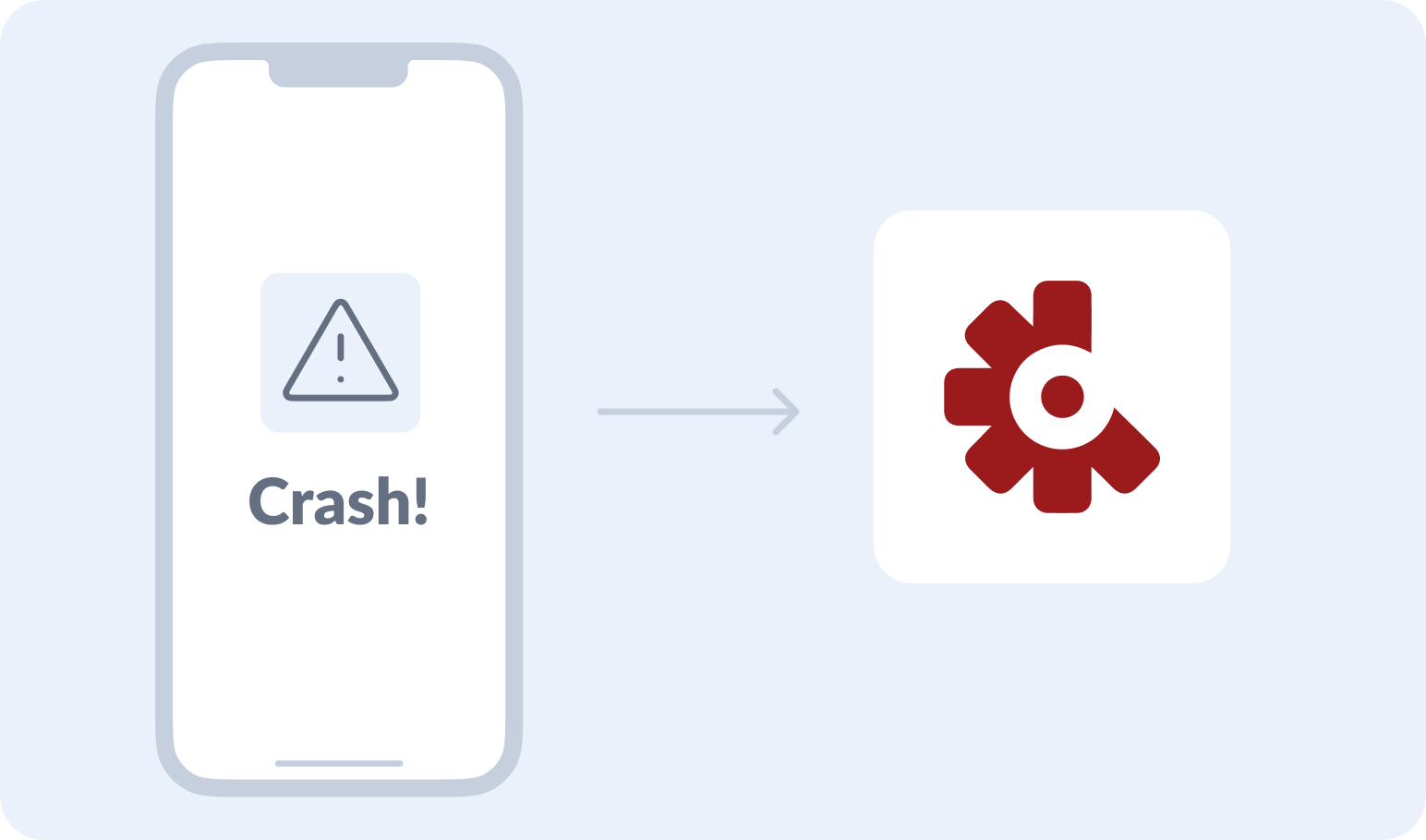
Integrate an analytics tool
Analytics tools provide travel apps with valuable insights into user behavior, app performance, and the effectiveness of marketing campaigns. We primarily use Firebase Analytics, Mixpanel, and AppsFlyer for user attribution.
Firebase is free and offers comprehensive app analytics to understand user engagement, retention, and conversion. It allows us to track user interactions, providing insights into user demographics, journeys, and in-app events. This helps optimize the app experience based on real user data, improving travel app retention rates.
Implement an A/B testing framework
A/B testing involves comparing two screen or app element versions to determine which performs better. Tools like Firebase Remote Config and Optimizely enable us to experiment with different versions of features, content, and user experiences to optimize app performance and user engagement.
Tech stack for travel app development
Let’s explore the advantages and downsides of different travel mobile app development methods and discuss the technology stack we have found to be the best.
Mobile app development
There are several approaches to building mobile applications, from native to cross-platform and hybrid options, using various tools.
Cross-platform
The cross-platform option involves developing a single codebase that works for both platforms, which is quick and cost-efficient. Developers generally use React Native or Flutter fo%r this purpose. At Zoftify, we believe React Native is the best framework for developing travel apps due to its cross-platform nature, popular programming language (React.js), and the availability of thousands of open-source modules and libraries.
After building dozens of apps, we see that React Native offers the best ROI for travel businesses and has become our core framework for mobile app development.
Native
Native travel app development involves building separate apps for each platform, using Swift for iOS and Kotlin for Android. While this approach offers the best performance and access to all native features and APIs, it is time-consuming and typically increases development costs by 50% compared to React Native, as well as time-to-market.
Hybrid (web views)
Hybrid travel app development involves creating a web application and placing it in a container within the app. It uses HTML, CSS, and JavaScript wrapped in a native container (using tools like Ionic Capacitor). Hybrid apps are faster to develop but have significant limitations on features and are much slower, with boot times up to five times slower than React Native/native apps.
Backend development
To display flights, hotels, or other content within your app, you need to retrieve this information from the server via the API. This involves integrating third-party APIs (e.g., from the GDS) and developing your own APIs (e.g., to store booking information).
Our go-to stack is Node.js (NestJS) and PostgreSQL, but we also build projects with Java (Spring) and Python (Django).
Web development
Even if you build a dedicated app, you may need to build an admin panel to manage the app's content. We recommend building admin panels with React.js or Strapi (a headless framework).
Cloud
Our preferred cloud provider is Amazon Web Services (AWS). We use AWS for running backend and frontend applications, hosting databases and files, and managing CDNs.
You can also use Google Cloud Platform (GCP) or Azure.
Travel app development team
Previously, we outlined the app development process and technologies required, but what about the team supporting it?
Several roles are required for any travel app development project: mobile developers, backend developers, project manager, UI/UX designers, and QA engineers. Optionally, a business analyst, product designer, web developers, and DevOps may be needed for more complex projects. Let’s discuss the responsibilities of each role.
Mobile developers
A travel app cannot be built without mobile developers. They handle the programming, implement features, and create the user interface according to design specifications. They also collaborate with QA to resolve issues and bugs identified during testing to ensure smooth performance.
Work with travel software experts
Led by former Booking.com and Expedia employees
Backend developers
Backend developers focus on creating and integrating APIs that allow the travel app to interact with external services and data sources. They ensure that the APIs are scalable, secure, and optimized for efficient data exchange, contributing to the overall performance of the app.
Project manager
The project manager oversees the overall project flow and team. They ensure that the team stays on track with the project timeline and budget, coordinating and communicating with team members to ensure the travel application development process goes smoothly.
UI/UX designers
The UI/UX designer focuses on the user interface and user experience, creating wireframes, prototypes, and visual elements of the app to ensure a seamless and engaging flow. They also conduct user testing to gather feedback and iteratively improve the design based on user interactions and preferences.
QA engineers
The QA engineer is responsible for testing the product to ensure it meets quality standards, is free of bugs, and functions as intended. They work closely with UI/UX designers and developers to identify and address usability or functionality issues. We involve QAs not only during the development phase but also to review designs. They challenge designers with questions about workflows, business logic, and provide unbiased feedback on the product.
Testing is as important as development in travel and hospitality apps, ensuring the application functions smoothly, offers a great user experience, and meets all technical requirements before its public release.
Business analyst
The business analyst provides strategic guidance and defines how features should be technically implemented. They analyze business requirements and ensure development aligns with overall business goals.
Product designer
In complex projects, a UI/UX designer might not be enough. Product designers create the global vision of the platform, its core features, and user experience, ensuring the app meets its business goals. Compared to UI/UX designers, product designers focus more on business value, objectives, and end-user experience rather than individual UI elements and screens.
DevOps
DevOps is responsible for setting up the cloud ecosystem and ensuring a seamless development process and flow. They set up CI/CD pipelines, manage cloud resources and servers, and ensure the platform can handle the load.
Timelines and costs
What is the travel app development cost? Every project is different, but here are some estimates to consider while planning your travel app:
- A simple app (e.g., a concierge app for travel agencies) will take around 3 months to build and cost between $50,000 and $100,000.
- A mid-complex app (e.g., a travel planner app) will take 3-5 months to build and cost between $100,000 and $180,000.
- A complex app (e.g., a booking app for an OTA supporting various inventory types and integrations) will take 5+ months to build and cost $180,000+.
Let's develop your travel app
Reach out to us, and we'll make it happen
Tips for choosing a travel app development partner
You obviously want to build a successful travel app, and a big part of it is who you choose as your technology partner. Here are key points to keep in mind:
Travel industry experience
A partner with travel industry experience will have a deep understanding of market trends, user expectations, and common challenges. They can leverage this knowledge to build a more effective and user-friendly app.
Imagine explaining the basics of the travel business to the company you hire. Would they know the specifics of how travelers make booking decisions? Probably not, which means time wasted for you.
Technical expertise in travel integrations
Let's be honest, travel integrations aren't always as convenient as they seem. For instance, integrating GDS is often not the most pleasant thing.
Also, they need to undestand how to display data from various suppliers, map it with rich media, and understand what data to cache and what must always be up-to-date.
Easy communication
According to PMI, 48% of projects aren't successful due to poor communication. Providing clear and transparent expectations and timely updates should be the main goal of your software development partner. However, often this is not the case.
Ensure the people you speak to are direct, specific, and knowledgeable.
Established delivery processes
Poor processes lead to poor results. Companies with established planning, design, development, release, and maintenance processes deliver much better results since they can prevent issues and catch bugs early.
Look for a partner with a structured project management and delivery approach, demonstrating their ability to meet deadlines and manage budgets effectively.
Post-launch support
Imagine you built an app, tested it with beta users, and would like to adjust a thing or two. Or Booking.com may decide to discontinue their Demand API v2. What would you do without an agency that could support you long-term?
Choose a partner who offers robust post-launch support to handle updates and unforeseen changes.
Looking to build a travel app?
Let's discuss this together
Our experience in travel app development
At Zoftify, we specialize in mobile app development for travel companies. We’ve built dozens of travel apps of various sizes and niches and know what works and what doesn’t. Unlike other agencies without travel-related experience, we understand the complexities of the market, how to connect various travel APIs, and how to drive bookings.
Some of our work examples:
- The app we built for Tourshunter increased their repeat bookings by 55%
- The Wooni app for the Dutch rental market was acquired by a famous real estate agency
- The Readyhubb app was featured by Forbes
Related articles
Alex loves travel and tech and founded Zoftify to help travel companies use technology more effectively. Before this, he worked in tech consulting, where he led international mobile development teams.
148 (85)